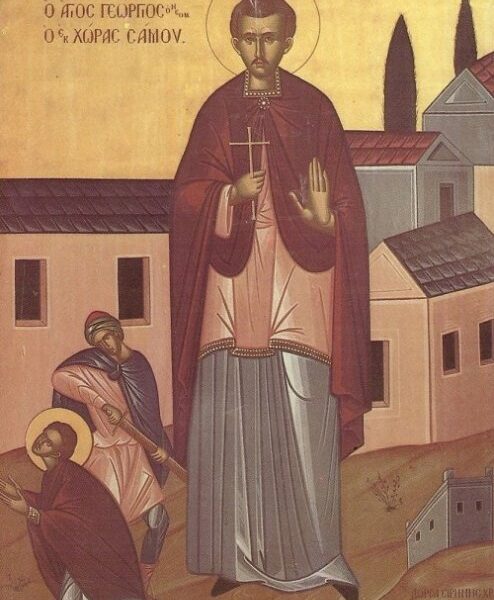Turks and Christians alike saw his martyred body radiating shafts of wondrous light
5 April 2023Edited by Stelios Koukos
[…] Be that as it may, when the judge realized that he [Saint Georgios] was unwillingly to change his mind [about converting to Islam], he ordered him to be put to death by the sword. The executioners rushed at him and brutally took him to the place of execution, forcing him to kneel. One of them drew his sword and made a pass with it before the martyr’s eyes, presumably to frighten him, but then a Turk arrived in haste. This man, Osman by name, pretended to feel sorry about what was happening: ‘Hold up’, he said. ‘What’s this you’re doing?’. Turning to the martyr he said: ‘Don’t throw your life away. Just say the shahada (Muslim confession of faith) and get up and leave this place. Go and live as you wish’.

The martyr replied: ‘I’m a Christian, my name’s Georgios and I don’t want your advice’.
The cellat (executioner) asked him: ‘Will you make the confession?’, but Georgios answered: ‘I’m Christian’. The cellat told him to bow his neck, which he did with a radiant countenance. And thus the executioner beheaded him, on a Friday, at the third hour of the day.
As day dawned on the Saturday, a great many people, not only Christians but heathens as well, looked at his martyred body and saw that it radiated shafts of wondrous light. This same light shone in the martyr’s blood for as long as it lasted, given that the place was on a downward slope and flagged with stones.
As Saturday progressed, news of the miracle spread, so the judge immediately ordered two hammallar (porters) to pick up the holy corpse and, together with some Christians, they transported it some distance away and buried it at the tomb of the holy martyr Polydoros.
While the grave was being dug, some of the Christians who had gathered cut off locks of the martyr’s hair, while others cut up his clothing, telling the Turks that it would act against fever. One of the latter took a piece for his brother who was burning. In this way, he highlighted the martyrdom, to the undying shame of the heathens and the excessive joy and exultation of the Christians, to the glory of our almighty God.
In this way, Saint Georgios, through his superhuman struggles at his martyrdom, glorified God, who returned the glory through the miracles he performed as almighty God.
Shortly afterwards, a certain Nikolaos Karpathios suffered many days with a terrible pain in his stomach. He tried many and varied remedies, by found no relief from any of them. Despairing of human assistance, he had recourse to the intercessions of the martyr. He managed, with great difficulty, to get to the grave of the martyr, onto which he fell with great reverence and heartfelt contrition. In tears, he entreated the saint to help him and that night, in a vision, he saw Saint Georgios, dressed in the same attire as Saint Panteleimon, saying to him: ‘Nikolaos, what do you want?’. He touched the man’s stomach with a probe, just where the pain was. Miraculously, the pain ceased at once and the sick man became hale and hearty, glorifying God and thanking the saint.
By his prayers may we be kept safe from all assaults and may we be counted worthy of the heavenly kingdom. Amen.
Saint Georgios from Ephesus was martyred on 5 April, 1801.






